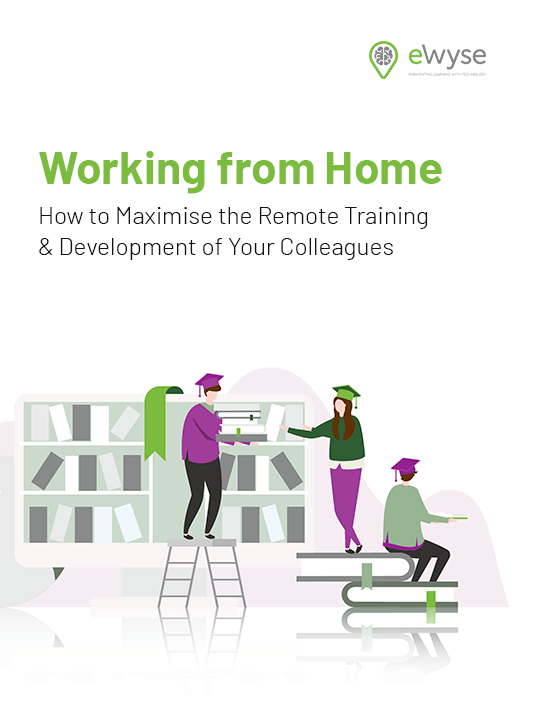Adapting To The New Normal: Remote Workforce Training And Development Benefits
The COVID-19 pandemic at the beginning of 2020 brought many areas that impact employee satisfaction and company success into sharp relief. As the year stumbled forward, the need to survive became the need to adapt to new circumstances. As a result, remote working and training is now fully accepted in business, and ways to train and develop employees remotely came into a renewed focus as a result of these unprecedented events. But there are also other reasons for the wide-scale acceptance of remote working.

3 Reasons Why Working From Home Is Part Of The New Normal
Shifts In Habits And Culture
Yes, it’s hard to argue that habits and culture haven’t been irrevocably changed by these world events. But the acceptance of working or training from home has been a growing trend long before face masks became fashion statements.
While the pandemic may have been the catalyst for many companies moving employees out of the office, the cost savings of working from home have been hard to ignore. There is no need, for instance, to pay for expensive utilities at offices and workspaces, or for cleaning services and even food, when each individual is working from home. Even if a proportion of staff still need to attend the workplace, with a reduction in numbers, there are still bound to be huge savings.
Effectiveness
There are many studies to back up the view that remote work is actually far more effective6 than working from the office every day of the week. With fewer office-based distractions, often more comfortable surroundings and also an increase in overall motivation- levels, working and training remotely has become increasingly recognised as more effective than that in the traditional office environment.
Improvements In Technology
The speed of technological advance is jaw-droppingly fast and famously shown by Moore’s Law. This progress has been reflected in all areas of modern society, not least in areas of business, where efficiencies are ruthlessly exploited. This includes remote working, where faster Internet connectivity, almost fail-safe video-conferencing, engaging VR/AR applications or 360 degree video engage the learner and ensure companies’ development goals are met.
Top Remote Workforce Training & Development Benefits
Improvements in staff morale, better retention and productivity, increased company revenue and profits, the list that underlines the importance of employee development is fully accepted. However, there are reasons why many employers don’t follow through on the delivery of this benefit. In the main section of this report, we’ll dive deeper into the main challenges that you may also have faced, together solutions that we have developed in many cases. First, let’s expand on why it’s so important to focus on workforce development.
Increase Employee Morale & Retention
According to a study by the International Journal of Management Studies, there is a strong, positive link between the provision of training and employees’ morale in the workplace. Better trained
employees show an increase in confidence when handling more responsible tasks, improved morale and clear career progression. These benefits result in more employee loyalty and lower company costs around firing, hiring and re-training new colleagues.
Improve Company Performance
Long term studies by the Association for Talent Development (ATD) found that companies investing in staff development enjoyed a number of huge benefits, including 24% higher profit margins and 218% higher income per employee. The need to train and develop remote workers is, arguably, even more important: Training courses, if conducted the right way offer the opportunity for staff to be better connected and motivated, which naturally leads to an improvement in personal performance that positively impacts a company’s results.
Keep in Line With Legal Obligations
In certain business sectors, it’s down to the employer to train the employees. Remote work may have caused companies to change their training methods, but there is often a legislation-backed
need for them to keep the workforce updated with current industry information. Industries impacted by a requirement for rigid health & safety regulations such as hospitality and construction, or the banking and pharmaceutical sectors which have their own need for training to safeguard minimum standards, all stick to strict legal guidelines that must be implemented.
Conclusion
Another undeniable benefit is continuity of operations. Running with a ‘business as usual’ mentality has an advantage in many ways. This is especially true regarding staff motivation, skills and goal setting. Investment in technology and content to allow for better conditions for remote workers means that companies can prevent unwanted problems of increased staff absences, lower productivity or operation issues due to a lack of skilled resources.
Looking for more insights on how to adapt to a post-pandemic corporate world? Download the eBook Working From Home - How To Maximise The Remote Training And Development Of Your Colleagues to learn how to address your L&D challenges with online training solutions.
Information Sources (Studies):
- The Remote Work Experiment That Upped Productivity 13%
- Influence Of Training On Employee Morale
- Profiting From Learning: Do Firms’ Investments in Education and Training Pay Off?










